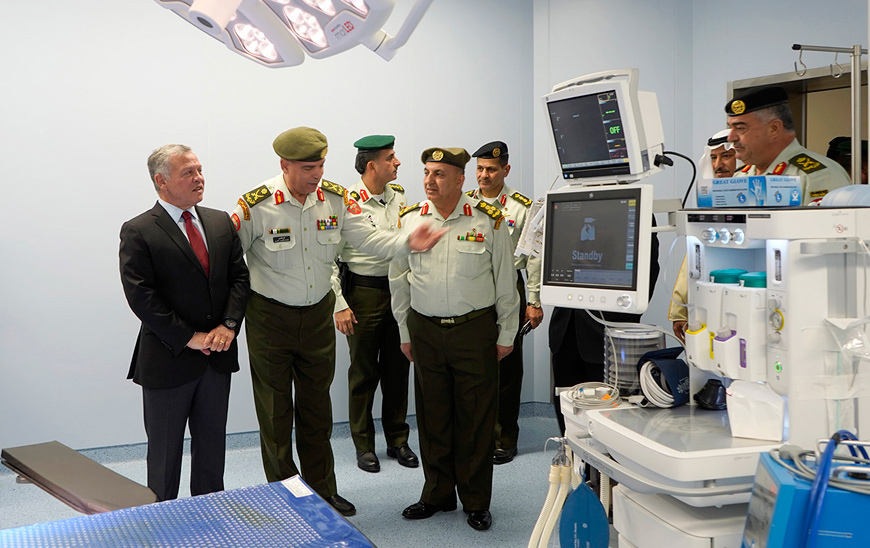AMMAN — His Majesty King Abdullah, the Supreme Commander of the Jordan Armed Forces-Arab Army, on Monday inaugurated the newly-renovated Queen Alia Hospital in Amman, opening the door for military personnel and civilians to enjoy modern medical facilities.
The JD37-million rehabilitation project gave the hospital, which was first opened in 1987, a facelift by modernising certain sections and adding new facilities.
The hospital, which has been closed for four years for the renovation, is ready to receive patients and has been fitted with modern equipment in accordance with international standards, its director, Brig. Gen. Ahmed Toulfah, said.
“The maintenance and rehabilitation of the hospital, upon Royal Directives, included equipping the medical premises with state-of-the-art medical equipment and furniture, as well as increasing the number of hospital beds from 237 to 405,” Toulfah told reporters.
The hospital director said that the facility is now ready to deal with a higher number of patients and at the same time has been “beefed up with new sections and equipment”.
“Our main concern is to provide the best medical treatment and services to our personnel and our citizens, and anyone seeking to get the best treatment in the region,” Toulfah added.
The renovation and expansion of the facility included a three-story building that houses 56 clinics and a separate administration building, which includes a modern Haemodialysis Department with 28 machines, according to Toulfah.
A dentistry section was also established, with 12 specialised clinics and x-ray machines.
“We also established a special section that includes two fully integrated medical modular rooms — the first of its kind in the region — which works to ease up the work of the physicians and surgeons,” Toulfah said.
The hospital’s director added that future plans encompass a bone marrow transplant unit, “which is expected to open by the end of this year”.
King Abdullah, accompanied by Chairman of the Joint Chiefs of Staff Lt. Gen. Mahmoud Freihat as well as the Saudi and Japanese ambassadors to Jordan Prince Khaled Bin Faisal Bin Turki and Hidenao Yanagi, toured the hospital to get a firsthand look at the new equipment and sections.
The King also checked on some patients at the medical facility and greeted attending doctors and nurses who were on duty.
Part of the renovation was done with the support of the Saudi Fund for Development and the Japanese government, Royal Medical Services (RMS) Director General Maj. Gen. Saad Jaber said.
The newly-renovated sections also included those in surgery, internal medicine, paediatrics, orthopaedic surgery, obstetrics and gynaecology, Jaber told reporters.
The labs were also renovated, Jaber added, noting that the renovations included a blood bank, as well as labs for stem cells, chemistry and microbiology.
“The x-ray section was also expanded to include magnetic resonance imaging, axial tomography, fluoroscopy and mammograms,” Jaber said.
The RMS director added that he is hopeful the reopening of Queen Alia Hospital, which “comes on the eve of the 20th anniversary of King Abdullah’s Accession to the Throne”, will ease the pressure on other military facilities in Amman and Zarqa.
“The King Hussein Medical Centre [KHMC] receives thousands of visitors on a daily basis, and our aim is to ease the congestion at that medical facility and other facilities in Amman’s Marka and in Zarqa,” Jaber explained.
Plans for the KHMC, according to Jaber, include building a tower to provide an additional 950 beds by the end of 2020.
“We are also in the process of building a military hospital in Maan, to serve its residents and other remote and secluded areas,” Jaber said.
The RMS director concluded by saying that “our physicians are constantly undergoing training abroad in various parts of the world to cope with the latest medical developments and advancements worldwide, and at the same time gain new experience and techniques that will help them with their noble and humanitarian mission”.
